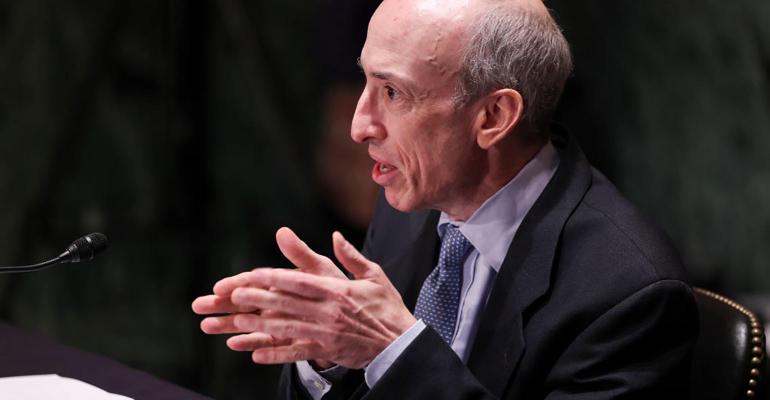(Bloomberg Opinion) -- The festive period trading lull bypassed stock market pros: Just 10 days before Christmas, the Securities and Exchange Commission dropped a raft of proposed new rules on them. Running to 1,656 pages, the draft left market participants with plenty to absorb.
For wholesalers such as Virtu Financial Inc. and Citadel Securities, the reading wouldn’t have provided much joy as a key theme emerged: minimizing their role in the stock trading value chain.
Gary Gensler, the chair of the SEC, made his motivation plain. “Today’s markets are not as fair and competitive as possible for individual investors,” he said. “There isn’t a level playing field among different parts of the market: wholesalers, dark pools, and lit exchanges.”
Wholesaling stocks is a relatively new niche, sitting between retail brokers and the market. It evolved following an earlier spate of rulemaking in late 1990s and early 2000s that essentially gave birth to the sector. The implementation of Reg NMS in 2007 and Reg ATSbefore it led to the fragmentation of the previously exchange-dominated market. Liquidity is now distributed over 16 national exchanges and more than 40 alternative trading systems (or “dark pools”); navigating the maze requires expertise and tools that retail brokers don’t have. As a result, they now route over 90% of their order flow through wholesalers. One of the largest, Charles Schwab Corp., explains the system as a “form of strategic outsourcing that leverages the concept of comparative advantage.”
But Gensler thinks wholesalers impede the transparency of markets and is wary of the power they have accrued. His proposed new rules threaten them in two ways. First, a reduction in minimum tick sizes attacks a key source of profit. Because they are not subject to the same minimum tick sizes as exchanges, wholesalers can profit from artificially wide bid-ask spreads. Smaller pricing increments would collapse spreads, transferring value from wholesalers and other intermediaries to end investors. Perhaps they shouldn’t complain: any business model born out of a regulatory arbitrage is at risk of being squeezed when the arbitrage disappears.
Yet if that isn’t enough, Gensler also proposes that wholesalers bid for retail order flow on a more transactional, order-by-order basis rather than via the bulk contracts they typically have with brokers. The SEC estimates this could free up $1.5 billion of value for end investors. While wholesalers are free to bid, the two largest exchanges — The New York Stock Exchange and Nasdaq — are well placed to compete. Doug Cifu, Virtu’s chief executive officer, is unimpressed. “30 years of competition and Gary, with zero equities-market experience, decrees let’s have a duopoly,” he tweeted. “I know better than 200 brokers who’ve been routing for 20+ years. Zero data. Gary is a politician playing regulator.”
Wholesalers and the retail brokers they work for alike have long argued they deliver better prices for retail investors. Aside from their ability to offer tighter spreads, they corral retail order flow together, protecting it from institutional activity which would likely trade against it on an exchange. According to Charles Schwab, “the fact that US equity market structure has enabled such a segmentation of retail order flow is the underlying driver of the value that retail investors have been able to increasingly participate in.” The broker estimates that in 2021, its clients received $3.4 billion in price improvement on equity orders using wholesalers versus what they could have achieved on an exchange (although in a possible third stab at knocking them down, the SEC argues that these numbers may be overstated and plans to revise the benchmark against which they are calibrated).
Even the SEC concludes that wholesalers do a good job. “Marketable orders routed to wholesalers appear to have higher fill rates, lower effective spreads, and lower E/Q ratios” — a measure of trade quality —its analysis states. According to SEC data, 83% of shares traded via wholesalers in the first quarter of 2022 benefited from some price improvement, compared with 9% on exchange.
The battle to remake the system will take time. The SEC will run a comments period through to the end of March; the pages are already filling up and the wholesalers themselves have yet to post an official response. The SEC may deplore them, but wholesalers won’t go down without a fight. In the meantime, they offer a valuable service to retail brokers and good prices to retail investors. Perhaps the market’s structure doesn’t need reforming after all.
More From Bloomberg Opinion:
- The SEC Wants to Upend the Stock Market. Should It?: Editorial
- Gensler’s SEC Is Learning to Pick its Battles: Editorial
- SEC's Views on Competition Would Stifle Innovation: Aaron Brown
To contact the author of this story:
Marc Rubinstein at [email protected]





